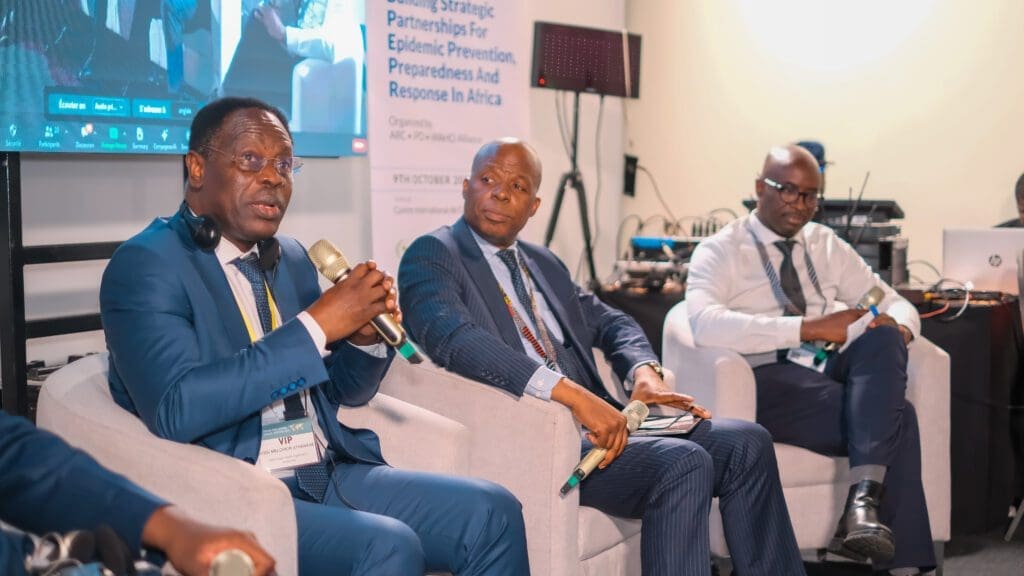Blog
Press Release: ARC, IPD, and WAHO’s Alliance mark significant progress in African epidemic preparedness
Dakar, 9th October – Seeking to boost the level of epidemic preparedness and response in Africa, the African Risk Capacity Group (ARC), Institut Pasteur de Dakar (IPD), and the West African Health Organization (WAHO) have unveiled their strategic collaboration plan, with support from the Bill & Melinda Gates Foundation (BMGF).
The hybrid event, held on the sidelines of the Grand Challenges Annual Meeting, under the theme “Building Strategic Partnerships for Epidemic Prevention, Preparedness and Response in Africa” explored the opportunities and challenges inherent in collaborative efforts to combat epidemics in Africa.
“Getting agencies to work together and within themselves is sometimes hard. Our African team’s aim is to support local African institutions; we stepped in to provide funding and resources that can help these organizations optimize their work. But it’s not just about resources, it is also about how different partners coordinate with each other,” remarked Natasha Quist, Deputy Director, Regional Representative West and Central Africa, at the Bill & Melinda Gates Foundation.
The high-level panel emphasized the importance of building sustainable capacities in ECOWAS member states, harnessing state-of-the-art technologies to respond and forge access to innovative finance mechanisms.
“We need to build the necessary capacity, funding and institutions, and above all be intentional about working faster and more effectively,” said Dr. Amadou Sall, Director General of the Institut Pasteur de Dakar, one of the continent’s leading vaccine manufacturers.

“An integrated approach to strengthening epidemic preparedness and response in the ECOWAS region will be crucial to implementing effective public policies. Through this roundtable, our aim is to make progress in our ambition to unleash the transformative power of collaboration,” he added.
The recent COVID-19 pandemic and the resulting North-South vaccine inequalities have highlighted the need for African countries to strengthen their institutional capacity to deal with epidemics
Ibrahima Cheikh Diong, United Nations Assistant Secretary-General and the Director-General of the African Risk Capacity Group called for more partnerships to address the challenge of drug manufacturing and supply chains in the continent.
“Our objective and ambition is to be inclusive. So, we are very much open to welcoming some new members to join us so that they can add value to what we are doing. Our mindset and our spirit is to make sure we expand the Alliance to not only the ECOWAS region but across Africa, and our objective and ambition is to be inclusive.”
In June 2022, ARC, IPD and WAHO came together and launched a historic tripartite alliance to facilitate an integrated approach that combines sound public policies, innovative financing solutions, and cutting-edge technologies. AfriCatalyst’s CEO Daouda Sembene, who was instrumental in the formation, unveiled a new motto to power the next phase of the Alliance – Scale Ambition Gender Efficiency, or simply SAGE.
“These four words were listed to illustrate the Alliance’s value addition and relevance. Whatever is done to better manage epidemics in Africa needs to comply with these principles in order to be impactful. We need to get things done instead of simply having a conversation”, highlighted Daouda Sembene, CEO of the Dakar-based development advisory firm AfriCatalyst.
Laurence Lannes, Senior Economist (Health) from the World Bank, highlighted that the multilateral lender is currently hosting pandemic funds, $2 billion in total. The funds have been set aside to respond to future pandemics in low and middle-income countries; with 37 countries in six regions so far having benefitted.
“There will be a second round of funding at the end of 2023. As far as COVID-19 is concerned, we realised that we weren’t adequately prepared as a financing institution on responding quickly to an emergency because of our procedures. The bank, since that time has really reinvented its effort and made instruments more flexible to tackle future epidemics,” she said.
The event concluded with a call to action to be pursue inclusivity, diversity and a demand-driven approach focused only on the needs of both West Africa and the entire continent.
About the Organizers:
The African Risk Capacity (ARC) Group is composed of ARC Agency, a specialized agency of the African Union founded in 2012, and the ARC Insurance Company Limited (ARC Ltd), a hybrid mutual insurer and the commercial affiliate of the Group founded in 2014. It assists African governments improve their capacities to better plan, prepare, and respond to natural disasters triggered by extreme weather events, as well as outbreaks and epidemics. https://www.arc.int
Institut Pasteur de Dakar (IPD) is a Senegalese not-for-profit foundation working to advance equitable access to health in Africa, especially in Senegal. We do this by providing communities with Healthcare Solutions and Laboratory services, engaging in cutting-edge Biomedical Research and Innovation, manufacturing Vaccines and Diagnostics essential to African populations, developing Human Capital, and engaging in Public Health activities such as epidemic intelligence, outbreak response, and surveillance. IPD is one of the four WHO prequalified manufacturers to supply yellow fever vaccines to UN Agencies. www.institutPasteurDakar.sn & follow IPD via @PasteurDakar
The West African Health Organization (WAHO) is the regional agency charged with the responsibility of safeguarding the health of the peoples in the ECOWAS region through the initiation and harmonization of the policies of Member States, pooling of resources, and cooperation with one another and with others for a collective and strategic combat against the health problems of the sub-region. https://www.wahooas.org/web-ooas/en/who-we-are
For inquiries, please contact:
Bineta Pouye
Chief Operating Officer at AfriCatalyst
Email: bpouye@africatalyst.com
Dakar, Senegal
